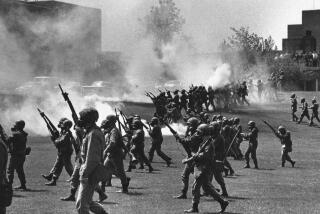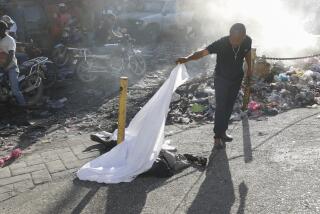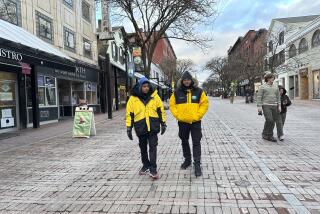Town Is on Edge After Rioting
- Share via
BENTON HARBOR, Mich. -- After two nights of racially charged riots, a small army of law enforcement officers from around the state huddled in a downtown parking lot here Wednesday, girding for another.
As the sun slipped west across Lake Michigan, a group of teens, some sporting fresh scars, gathered a few blocks away, promising the officers a fight.
“There’s gonna be some trouble tonight,” said one young man who concealed his face with his T-shirt and declined to give his name.
But as night fell, so did rain, and soaked crowds hurled nothing more than insults at police, who employed armored personnel carriers to cordon off the neighborhood where the violence has taken place. Police enforced an existing 10:30 curfew for those 16 and under, but decided against limiting the travel of all residents.
The combination of a large law enforcement presence and the rain kept the streets quiet.
Earlier in the day, nearly 300 officers donned gear and loaded assault rifles even as local officials in this mostly black town of 12,000 pleaded for peace after mayhem sparked by the death of a black motorcyclist, who crashed Monday while fleeing a white police officer.
In the hours after the death of 28-year-old Terrance Shurn, hundreds of residents gathered in front of the abandoned building near where he died; some then burned it down.
Over the next two nights, rioters, alleging a long history of police abuse and racial profiling, burned four other buildings to the ground -- one home belonging to a single father of five -- torched police cars and threw rocks and bricks at firefighters speeding to the scene. A dozen people have been stabbed or beaten, another dozen arrested. Police and rioters exchanged gunfire, with one passerby wounded in the shoulder by a shot from the crowd.
“The burning must stop,” City Commissioner James Atterberry said at a news conference. “The rocks must stop.”
But, he added, “We don’t believe that a person who doesn’t have a driver’s license, or tags not up to date, should die for that.”
City officials held their news conference in time for the evening television newscasts, and used it to plead for calm and to try to assure residents that their concerns were being taken seriously. “Let’s don’t destroy our city,” said City Commissioner Steven McCoy. “This is our city. When all’s said and done, it’s going to take us to put it back together again.”
Benton Harbor, a 110-mile drive from Chicago, is a small town on the verdant eastern shore of Lake Michigan, a place too pretty, it would seem, and too small to generate the critical mass of anger required for a race riot. For years, though, when people up and down the shore thought about Benton Harbor, they thought about race as well as poverty and unemployment.
According to the 2000 census, Benton Harbor is 92% black. The adjacent Benton Township is 52% black. The per capita income in Benton Harbor is $8,900; in Benton Township it is $14,100.
“All the cops around here hassle us, racial-profile us, but the Benton Township cops are the worst,” said Rodney Polk as he stood near the smoldering foundation of one of the burned homes.
It was Benton Township officers who were pursuing Shurn when he crashed, and Benton Township officers in another high-speed pursuit in 2000 in which the fleeing suspect struck and killed 11-year-old Trenton Patterson as he was walking along a Benton Harbor sidewalk.
Benton Township Police Chief Jim Coburn, who is black, pledged at a Township Board meeting Tuesday to review his department’s pursuit policy.
The Benton Harbor department has a policy not to engage in high-speed chases. Police Chief Sam Harris, who is also black, said he had no indication before Monday that residents believed they were unfairly treated by his police force.
While echoing rioters’ allegations of race-based mistreatment by local police, many residents expressed their disgust with the way the crowds had demonstrated their displeasure.
“Yes, there’s racial profiling,” said 32-year-old minister Dale Webbs during a break from mowing his mother-in-law’s lawn. “There are a lot of people here who have been through this justice system and understand the position of a young man on a motorcycle and in trouble with the law.
“But,” he continued, “if you have something to say, go say it, march down at the courthouse. If you can only say it at night, with bricks and rocks, something’s wrong.”
Michigan’s shoreline with its namesake lake has some of the most prized real estate in the Midwest, with its rare rolling hills, dense greenery and relatively few neighbors -- many of them Detroit auto executives and Chicagoans with vacation homes who can drive to them in a few hours. Taking the lake- shore road south from the state’s Upper Peninsula, or north from the Indiana line, visitors pass one quaint town after another.
Then they hit Benton Harbor, or, if they know the area, often bypass it. “What do you want to go there for?” a woman said when asked for directions Wednesday. “It’s always dangerous there, really dangerous now.”
Although it has all the hills and leafy trees of its more affluent neighbors, many of Benton Harbor’s shops have long been boarded up, many of its once-elegant homes broken down, their contents protected by steel meshing over the windows.
“This is a black town,” Polk said. “The other towns around here are white.”
They are also more prosperous. St. Joseph, which is also next door to Benton Harbor, is 5% black, and has a per capita income of $24,900 -- nearly three times that of Benton Harbor.
Among the group of young men warning of more mayhem was Jhurand Jennings. On Tuesday night he had rushed to help a family remove their belongings after rioters set their house ablaze, his friends said.
“It wasn’t supposed to be houses where people lived,” Jennings said, “only ones that are abandoned. I helped them.”
Sitting on the porch of the home she bought just last year, Zora Tyson, 49, said she understood the rioters’ frustration. She has a 15-year-old son, she said, who can’t find a summer job, also feels unfairly dogged by police, and had nothing to do on Tuesday except go into the streets and watch the riot.
Then the rioters set fire to the house next to hers. The flames charred the sides of her home. Her son came back and all the family fled.
She looked out across the black, smoking hole next door Wednesday, smiled a sad smile and said: “I always wanted a house where I could sit on the porch and have a view. I had that for a little while.”
More to Read
Sign up for Essential California
The most important California stories and recommendations in your inbox every morning.
You may occasionally receive promotional content from the Los Angeles Times.













